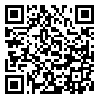Volume 28 - Supplementary
IBJ 2024, 28 - Supplementary: 161-161 |
Back to browse issues page
Download citation:
BibTeX | RIS | EndNote | Medlars | ProCite | Reference Manager | RefWorks
Send citation to:



BibTeX | RIS | EndNote | Medlars | ProCite | Reference Manager | RefWorks
Send citation to:
Valizadeh Laktarashi H, Sharafi S, Abrishamifar K, Nazari E. Effectiveness of Mobile Applications to Promote Mother and Child Health: A Systematic Review. IBJ 2024; 28 :161-161
URL: http://ibj.pasteur.ac.ir/article-1-4584-en.html
URL: http://ibj.pasteur.ac.ir/article-1-4584-en.html
Abstract:
Introduction: Maternal and child health remains a global priority, with a growing interest in utilizing technology to enhance healthcare interventions. Mobile applications have emerged as potential tools for promoting maternal and child health by providing information, support, and interventions. This systematic review aimed to evaluate the effectiveness of mobile applications in improving maternal and child health outcomes, focusing on health education, behavior change, and healthcare access.
Search Strategy: A comprehensive search of electronic databases was conducted to identify relevant studies published between 2014 and 2024. Electronic databases, including PubMed, Scopus, and Embase, were searched. The search terms entailed "mobile applications", "mother and child health", "health", and related keywords. Studies were included if they evaluated the impact of mobile applications on maternal and child health outcomes, such as prenatal care, vaccination rates, maternal and child mortality, and access to health services. The search strategy had no time limit. The inclusion criteria comprised randomized controlled trials, quasi-experimental, and observational studies. Two independent reviewers screened the articles, extracted data, and assessed the risk of bias.
Results: The systematic literature search identified 684 unique records, 31 of which met inclusion criteria. Mobile applications effectively improved maternal health outcomes, including antenatal care attendance, nutrition, and maternal mental health. Also, positive impacts on child health were observed, with improvements in vaccination rates, growth monitoring, and overall well-being. Mobile applications were associated with increased healthcare utilization, as evidenced by improved access to healthcare services, timely appointments, and adherence to recommended health visits.
Conclusion and Discussion: This systematic review suggests that mobile applications show promise in promoting maternal and child health by positively influencing various health outcomes and healthcare utilization. However, the heterogeneity in study designs and interventions underscores the need for standardized approaches and rigorous evaluation methodologies. Future research should focus on long-term impact assessment, scalability, and integration of mobile applications into existing healthcare systems to maximize their potential in improving maternal and child health globally.
Search Strategy: A comprehensive search of electronic databases was conducted to identify relevant studies published between 2014 and 2024. Electronic databases, including PubMed, Scopus, and Embase, were searched. The search terms entailed "mobile applications", "mother and child health", "health", and related keywords. Studies were included if they evaluated the impact of mobile applications on maternal and child health outcomes, such as prenatal care, vaccination rates, maternal and child mortality, and access to health services. The search strategy had no time limit. The inclusion criteria comprised randomized controlled trials, quasi-experimental, and observational studies. Two independent reviewers screened the articles, extracted data, and assessed the risk of bias.
Results: The systematic literature search identified 684 unique records, 31 of which met inclusion criteria. Mobile applications effectively improved maternal health outcomes, including antenatal care attendance, nutrition, and maternal mental health. Also, positive impacts on child health were observed, with improvements in vaccination rates, growth monitoring, and overall well-being. Mobile applications were associated with increased healthcare utilization, as evidenced by improved access to healthcare services, timely appointments, and adherence to recommended health visits.
Conclusion and Discussion: This systematic review suggests that mobile applications show promise in promoting maternal and child health by positively influencing various health outcomes and healthcare utilization. However, the heterogeneity in study designs and interventions underscores the need for standardized approaches and rigorous evaluation methodologies. Future research should focus on long-term impact assessment, scalability, and integration of mobile applications into existing healthcare systems to maximize their potential in improving maternal and child health globally.

| Rights and permissions | |
 |
This work is licensed under a Creative Commons Attribution-NonCommercial 4.0 International License. |







.png)
